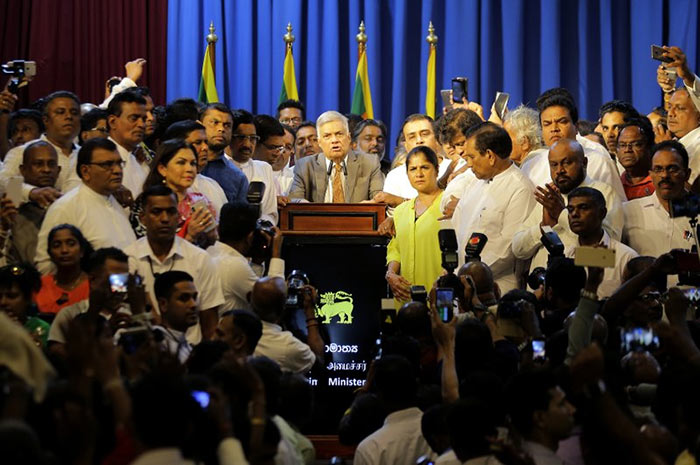Sri Lankan government defeats no-confidence motion

Sri Lanka’s government on Thursday defeated a no-confidence motion in Parliament that accused it of failing to prevent Easter Sunday bomb attacks that killed more than 250 people.
The motion against Prime Minister Ranil Wickremesinghe’s government was defeated by a vote of 119 lawmakers against to 92 in favor. The motion, submitted by the opposition Peoples’ Liberation Party, said the government should not remain in office because it failed to respond to intelligence reports ahead of the attacks by Islamic extremists on three churches and three luxury hotels.
Wickremesinghe’s defeat of the motion is expected to strengthen his hand in his rivalry with the country’s president, Maithripala Sirisena, ahead of elections slated for this year — including a presidential election which both Sirisena and Wickremesinghe are expected to contest.
The motion was debated on Wednesday and Thursday.
During the debate, opposition lawmakers blamed Wickremesinghe and the government for failing to prevent the April 21 attack, despite the fact that “proper information” was available regarding the attackers. Government supporters argued it was unfair to blame the government and prime minister when the security establishment, including police, was under the control of Sirisena, who is also the country’s defense minister.
The attack by seven suicide bombers from a local Muslim group, National Thowheed Jammath, was the worst violence by Islamic State group-linked militants in South Asia.
Sri Lankan leaders and the security establishment came under fire for not acting on near-specific intelligence information on possible attacks on churches. The government has acknowledged that some intelligence units were aware of possible attacks weeks before the bombings.
Sirisena’s enmity with Wickremesinghe and his Cabinet and a lack of communication between the two leaders is also considered a key factor in the breakdown of intelligence sharing ahead of the attacks.
Sirisena, who was health minister under former strongman President Mahinda Rajapaksa, quit that government and teamed up with Wickremesinghe to defeat Rajapaksa in the 2015 presidential election.
However, the two leaders fell out and their rivalry became public last October when Sirisena sacked Wickremesinghe and appointed Rajapaksa as prime minister. The crisis brought the country to a standstill for seven weeks and was only resolved after a court ordered Sirisena to reinstate Wickremesinghe.
Sirisena has said he was kept in the dark on intelligence about the attacks and vowed to “take stern action” against officials who failed to share it.
Following the attack, national police chief Pujith Jayasundara was suspended and former Defense Secretary Hemasiri Fernando resigned. Both were arrested last week for alleged criminal negligence and later released on bail.
A parliamentary committee is looking into intelligence failures despite objections by Sirisena after some officials hinted at shortcomings by the president.
(AP)

Latest Headlines in Sri Lanka
- UN pledges support for Sri Lanka’s industrial and SME development March 13, 2025
- Former Boossa Prison Superintendent shot dead in Akmeemana March 13, 2025
- Police search Sagala Ratnayaka’s residence amid hunt for IGP Deshabandu Tennakoon March 13, 2025
- Another Middeniya triple murder suspect arrested at BIA while fleeing March 13, 2025
- Court of Appeal to rule on IGP Tennakoon’s arrest warrant on March 17, 2025 March 12, 2025


